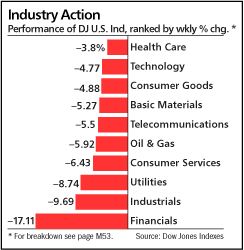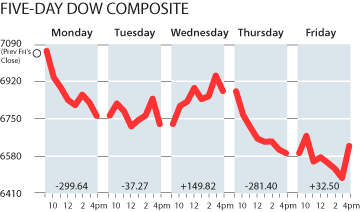AT&T and Verizon: Winning the Air War
By TIERNAN RAY
THE UNITED STATES' TWO LARGEST PHONE companies just took out a lease on the future, and buying their stocks could also be a good long-term investment.
AT&T, which owns the largest cellular outfit in the land, and Verizon Communications, whose wireless service is No. 2, bid roughly $16 billion last month effectively to rent airwaves that will put both companies well ahead of U.S. wireless competitors Sprint Nextel and T-Mobile (a unit of Deutsche Telekom).
The benefits of the auction will take years to unfold, but the bids are significant for what they say about AT&T's and Verizon's financial positions: Both are borrowing and spending billions on top of the billions they already owe. That makes them, in effect, two gold-plated borrowers that can still tap the credit markets even in the worst credit crisis the U.S. has seen in decades.
AT&T will likely end 2008 being the top corporate debtor in the land, outside of financial firms, and Verizon just went into the debt market again today, with an apparently strong reception from credit markets, according to Citigroup's debt analysts.
And that suggests both stocks are stable, high-dividend-paying investments that should appreciate as both companies become even more secure competitively in coming years.
Shares of both AT&T and Verizon have fared better than the Standard & Poor's 500 in the last 12 months. Factoring in dividends (see At a Glance), AT&T returned 2.8%, and Verizon, 3.52%, versus a 2.6% decline for the S&P 500, counting dividends.
"Both AT&T and Verizon have locked in a competitive advantage with these auctions," says Blair Levin, a former Federal Communications Commission official and now a telecom strategist with Stifel Nicolaus in Washington, D.C.
"There's nothing that comes close to these two companies in the telecom sector," adds Citigroup corporate bond analyst David Hamburger, referring to the fact that both companies' bonds are a solid single-A, versus competitor Sprint, whose debt rating varies from junk to near-junk.
If the benefits of the auction are not immediately clear to investors, it's because both companies will have to spend more to erect more cell towers, with uncertain return.
That uncertainty has kept the stocks from fully reacting to this favorable development. In fact, the stocks hardly moved when the auction results were announced on March 20.
"Both companies have set themselves up pretty well far into the future by creating an inventory of exceptionally high-quality spectrum," says telecom analyst Craig Moffett with Sanford Bernstein. "Now comes the follow-on question -- can they earn a return on the investment?"
Thanks to the physical properties of the airwaves both companies just won, the answer should ultimately be yes because capital costs could be minimized. The auction was for airwaves at a frequency of 700 megahertz.
Those wavelengths go through buildings easier than today's cellular frequencies at 1900 megahertz. That means AT&T and Verizon could offer in-building cellular phone coverage without having to put radio equipment in buildings.
Moreover, because 700 megahertz wavelengths travel farther than higher frequencies, both AT&T and Verizon could cover their markets using fewer towers than competitors Sprint and T-Mobile, who have higher frequencies.
"The deployment costs [for AT&T and Verizon] are less than for WiMax," says analyst Tom Watts with Cowen & Co., referring to Sprint's next-generation wireless technology, which will be offered commercially starting this year. "The numbers I've seen suggest they could get by with as little as one-quarter of the infrastructure in towers and equipment as for WiMax," says Watts.
(Construction likely won't start until after TV broadcasters currently occupying 700 megahertz spectrum vacate early next year.)
If AT&T and Verizon can minimize capital required to build the 700 megahertz spectrum, while raising prices for broadband wireless connections, the profits they reap will help to offset their declining wireline phone business and protect the dividend.
The question remains whether investors are buying AT&T's and Verizon's shares as growth stocks or value stocks, an issue that Bernstein's Moffett says weighs on the shares.
"We're going through a transition in the Verizon shareholder base," says Moffett. "The bloom is off the rose in the wireless business," as the U.S. wireless market becomes more mature, says Moffett. About 84% of the market has cellular service in the U.S., trimming growth prospects for wireless services.
The danger is that as the growth engine of wireless cools, and AT&T and Verizon attract more conservative, value-type investors, those investors may become impatient with the future capital requirements of building out the 700 megahertz spectrum.
But a look at AT&T's and Verizon's debt suggests both companies have the financial flexibility to deliver the two things that really matter: dividends and buybacks.
AT&T in 2008 will issue about $17 billion of new debt, of which $6.6 billion will go to paying for the spectrum they're leasing, according to Citigroup's Hamburger.
Another $8 billion could go to share repurchase, he expects. And the dividend is safe, says Hamburger: "We're expecting that's a fixed cost that will be there for the foreseeable future."
As for Verizon, it may issue about $15 billion of new debt this year, estimates Hamburger, of which $2.5 billion could go for share buybacks.
Not only are both companies able to tap credit markets, but both have seen their cost of borrowing rise only slightly, says Hamburger. Where AT&T's cost of debt was 5.5%, on average, in 2007, it will only rise "by 20 or 30 basis points," above Treasuries, he projects, indicating AT&T, and Verizon, are getting favorable terms to borrow.
Compare that to other businesses that may be seeing spreads of 400 basis points or more, says Hamburger.
It's too early to tell what profits AT&T and Verizon will wring from their auction leases; the networks haven't even been built yet. But with the credit markets essentially willing to lend both companies billions of dollars for new investment, it seems the things value investors care about -- namely dividends and share repurchases -- will remain secure as both companies extend their lock on the wireless market.
Subscribe to:
Post Comments (Atom)



No comments:
Post a Comment